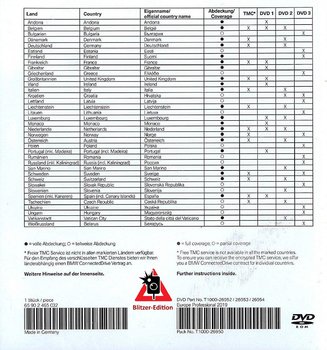
Free Download Bmw Dvd Road Map Europe Professional 2011
Main article: In the 14th and early 15th centuries, three members of the reigned as. In 1437, the House of Luxembourg suffered a succession crisis, precipitated by the lack of a male heir to assume the throne, which led to the territories being sold by Duchess to of. In the following centuries, Luxembourg's fortress was steadily enlarged and strengthened by its successive occupants, the,, and the French. Nineteenth century [ ] After the of in 1815, Luxembourg was disputed between and the. The formed Luxembourg as a within the. The Dutch king became, in, the grand duke.
Find great deals on eBay for BMW Navigation DVD in Software & Maps. Free Shipping. BMW Navigation DVD Road Map Europe PROFESSIONAL 2017, 2018. 128i 135i 1-Series Coupe Navigation DVD West Coast Map 2011 Update.
Reset chip fix generator samsung clp 325 1. Does anyone know if this mod works with the newer 325 model? Should I buy a refill kit (I've only seen them available abroad from farbtoner) with the replacement chips and wait for it to be empty? Hi, I have a Samsung clp-325 laser printer. My yellow toner is about half full (I use a lot of it) and I want to be prepared for when it runs out. I've seen tutorials on youtube showing how to make the 310/315 model not need the chips on the toners so you can just refill them.
Although he was supposed to rule the grand duchy as an independent country with an administration of its own, in reality he treated it similarly to a Dutch province. The was manned by Prussian troops for the German Confederation. This arrangement was revised by the 1839, from which date Luxembourg's full independence is reckoned.

At the time of the of 1830–1839, and by the 1839 Treaty establishing full independence, Luxembourg's territory was reduced by more than half, as the predominantly was transferred to. In 1842 Luxembourg joined the German Customs Union (). This resulted in the opening of the German market, the development of, and expansion of from 1855 to 1875, particularly the construction of the Luxembourg- railway line, with connections from there to the European industrial regions. While Prussian troops still manned the fortress, in 1861, the was opened, the first road bridge spanning the river valley, connecting the and the main fortification on the Bock with, opened in 1859, on the then fortified Bourbon plateau to the south. View of the along river in the historical heart of Luxembourg City.
After the of 1866 nearly led to war between Prussia and France, the Grand Duchy's independence and neutrality were again affirmed by the 1867, Prussia's troops were withdrawn from the Fortress of Luxembourg, and its Bock and surrounding fortifications were dismantled. The remained as, maintaining a personal union between the two countries until 1890. At the death of, the throne of the Netherlands passed to his daughter, while Luxembourg (then restricted to male heirs by the ) passed to. At the time of the in 1870, despite allegations about French use of the Luxembourg railways for passing soldiers from (then part of France) through the Duchy, and for forwarding provisions to Thionville, Luxembourg's neutrality was respected by, and neither France nor Germany invaded the country. But in 1871, as a result of Germany's victory over France, Luxembourg's boundary with, containing Metz and Thionville, changed from being a frontier with a part of France to a frontier with territory annexed to the as under the. This allowed Germany the military advantage of controlling and expanding the.
Twentieth century [ ]. The Golden Lady World War I memorial monument of the capital of Luxembourg In 1940, after the outbreak of, Luxembourg's neutrality was again violated when the of entered the country, 'entirely without justification'. In contrast to the First World War, under the, the country was treated as German territory and informally annexed to the adjacent province of the. A based in London supported the, sending a small group of volunteers who participated in the. Luxembourg was liberated in September 1944, and became a founding member of the in 1945. Luxembourg's neutral status under the formally ended in 1948, and in 1949 it became a founding member of.
In 1951, Luxembourg became one of the six founding countries of the, which in 1957 would become the and in 1993 the. In 1999 Luxembourg joined the.
In 2005, a was held. The exploiting the ' rich iron-ore grounds in the beginning of the 20th century drove the country's industrialisation. After the decline of the steel industry in the 1970s, the country focused on establishing itself as a global financial centre and developed into the banking hub it is reputed for.